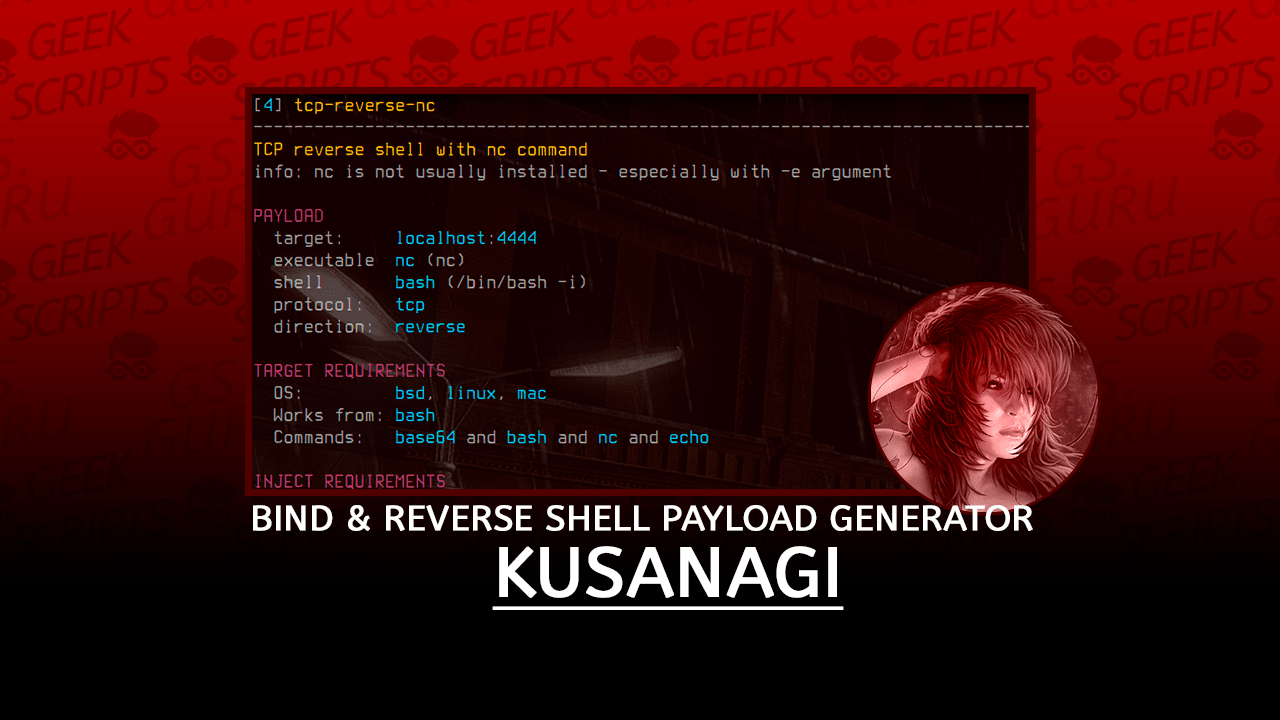At its core, it is just a collection of Yaml files that define various shell commands, code snippets, file specifications and obfuscators. It combines and permutates all of them to generate payloads according to someone’s need.
Payloads are highly searchable and filterable in order to generate a code-, file- or command injection with correct binaries for the target architecture and removed bad chars that might get filtered/denied by certain mechanisms which are in between you and the target (e.g.: web application firewall). Additional output encoding can be applied on your generated payloads (See list of encoders).
Disclaimer: It does have a copy-to-clipboard function to eliminate heavy mouse gestures.

Install
- ❗ Requires Python >= 3.6
Execute the following command:
pip install kusanagiFeatures
You can find current features here:
- Automated Quote escaping
- Quote swapping
- Obfuscation
- Permutation
- Badchar elimination
- Output encoder
- Copy to clipboard
- Command injection
- Code injection
- File injection
- Payload: Persistence wrapper
- Payload: reverse shell
- Payload: bind shell
- Payload: port forwarding
- BYOY: Bring your own yaml – and have custom payloa
Usage
General
Kusanagi is separated into different usage section. To start off, you will have to choose between a shell command for command injection (cmd), a code snippet from a programming language for code injection (code) and a generated file for various exploits injected into it (file).
usage: kusa <payload> [options] addr [host]
kusa <payload> -h
kusa -v, --version
kusa -h, --help
Kusanagi is a bind and reverse shell payload generator with obfuscation and badchar support.
positional arguments:
<payload>
cmd Generate a command to be executed on a shell.
code Generate source code (e.g.: php).
file Inject source code in a file (e.g.: php in jpeg).
misc arguments:
-v, --version Show version information and exit
-h, --help Show this help message and exitInjectable commands (cmd)
Options for command injection/execution module.
usage: kusa cmd [options] addr [port]
kusa cmd -h, --help
positional arguments:
addr Address to listen or connect to.
port (Optional) Port to listen or connect to
Default: 4444
query arguments:
-e EXE [EXE ...], --exe EXE [EXE ...]
Command that will execute the payload
(e.g.: perl, python, php, nc, sh, bash, cmd, PowerShell, etc)
Default: do not filter by underlying command.
-s SHELL [SHELL ...], --shell SHELL [SHELL ...]
Shell on which the command (specified via -e)
will be executed. Some payloads use crazy output
redirections or pipes that will only work on certain
underlying shells.
(e.g.: dash, sh, bash, zsh, cmd, PowerShell)
Default: do not filter by underlying shell.
-b BADCHARS, --badchars BADCHARS
Exclude any payloads that contain the specified bad chars.
This comes in handy if you encounter a Web Application Firewall
that prohibits certain characters.
Default: Ignore badchars
-o {bsd,linux,mac,solaris,windows}, --os {bsd,linux,mac,solaris,windows}
Only fetch payloads which work on a specific operating system.
Default: fetch for all OS.
-m bytes, --maxlen bytes
Exclude any payloads exceeding the specified max length.
mutate arguments:
--obf Run the fun. This switch will apply obfuscator to all
payloads to get a different set of badchars.
--enc name [name ...]
Encode the output with one or more encoders.
When encoding multiple times, pay attention to the
order of specifying encoders.
Note that any filtering (-b, -o, etc) is not done on the
encoded payload. Filtering is done before.
To view available encoders, use --list-encoders.
helper arguments:
-q, --quick Show quick payload results (less detail).
-c [index], --copy [index]
Copy last shown payload to clipboard or specify index
of payload to copy to clipboard.
(indices are shown in square brackets next to payload)
misc arguments:
-h, --help Show this help message and exitExamples
- List reverse shells connecting to 10.0.0.1 (port 4444 by default)
kusa cmd 10.0.0.1- List reverse shells connecting to 10.0.0.1:1337
kusa cmd 10.0.0.1 1337- Copy last reverse shell payload to clipboard
kusa cmd 10.0.0.1 -c- Copy reverse shell with index 2 to clipboard
kusa cmd 10.0.0.1 -c 2- URL encode reverse shell
kusa cmd 10.0.0.1 --enc url- Base64 encode and then url encode reverse shell
kusa cmd 10.0.0.1 --enc base64 url- Obfuscate payloads
kusa cmd 10.0.0.1 --obf- Obfuscated and filter away ‘/’ and ‘$’ characters in payload
kusa cmd 10.0.0.1 --obf -b '/$'Injectable code (code)
Options for code injection/execution module.
usage: kusa code [options] addr [port]
kusa code -h, --help
positional arguments:
addr Address to listen or connect to.
port (Optional) Port to listen or connect to
Default: 4444
query arguments:
-l LANG [LANG ...], --lang LANG [LANG ...]
The payload language to query.
(e.g.: perl, python, php, etc)
Default: do not filter language.
-s SHELL [SHELL ...], --shell SHELL [SHELL ...]
Shell on which the command (specified via -e)
will be executed. Some payloads use crazy output
redirections or pipes that will only work on certain
underlying shells.
(e.g.: dash, sh, bash, zsh, cmd, PowerShell)
Default: do not filter by underlying shell.
-b BADCHARS, --badchars BADCHARS
Exclude any payloads that contain the specified bad chars.
This comes in handy if you encounter a Web Application Firewall
that prohibits certain characters.
Default: Ignore badchars
-o {bsd,linux,mac,solaris,windows}, --os {bsd,linux,mac,solaris,windows}
Only fetch payloads which work on a specific operating system.
Default: fetch for all OS.
-m bytes, --maxlen bytes
Exclude any payloads exceeding the specified max length.
mutate arguments:
--obf Run the fun. This switch will apply obfuscator to all
payloads to get a different set of badchars.
--enc name [name ...]
Encode the output with one or more encoders.
When encoding multiple times, pay attention to the
order of specifying encoders.
Note that any filtering (-b, -o, etc) is not done on the
encoded payload. Filtering is done before.
To view available encoders, use --list-encoders.
helper arguments:
-q, --quick Show quick payload results (less detail).
-c [index], --copy [index]
Copy last shown payload to clipboard or specify index
of payload to copy to clipboard.
(indices are shown in square brackets next to payload)
misc arguments:
-h, --help Show this help message and exitExamples
- List reverse shells connecting to 10.0.0.1 (port 4444 by default)
kusa code 10.0.0.1- List reverse shells connecting to 10.0.0.1:1337
kusa code 10.0.0.1 1337- Copy last reverse shell payload to clipboard
kusa code 10.0.0.1 -c- Copy reverse shell with index 2 to clipboard
kusa code 10.0.0.1 -c 2- Select only PHP code (-l/–language)
kusa code 10.0.0.1 -l php- URL encode reverse shell
kusa code 10.0.0.1 --enc url- Base64 encode and then url encode reverse shell
kusa code 10.0.0.1 --enc base64 url- Obfuscate payloads
kusa code 10.0.0.1 --obf- Obfuscated and filter away ‘/’ and ‘$’ characters in payload
kusa code 10.0.0.1 --obf -b '/$'cytopia sec tools
Below is a list of sec tools and docs I am maintaining.
| Name | Category | Language | Description |
|---|---|---|---|
| offsec | Documentation | Markdown | Offsec checklist, tools and examples |
| header-fuzz | Enumeration | Bash | Fuzz HTTP headers |
| smtp-user-enum | Enumeration | Python 2+3 | SMTP users enumerator |
| urlbuster | Enumeration | Python 2+3 | Mutable web directory fuzzer |
| pwncat | Pivoting | Python 2+3 | Cross-platform netcat on steroids |
| kusanagi | Payload Generator | Python 3 | Bind- and Reverse shell payload generator |
| badchars | Reverse Engineering | Python 2+3 | Badchar generator |
| fuzza | Reverse Engineering | Python 2+3 | TCP fuzzing tool |
| docker-dvwa | Playground | PHP | DVWA with local priv esc challenges |
kusanagi (this link opens in a new window) by cytopia (this link opens in a new window)
Kusanagi is a bind and reverse shell payload generator with obfuscation and badchar support.

